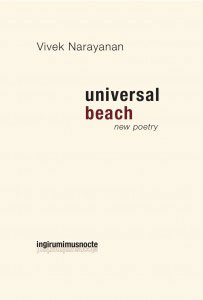When I was blogging for Harriet in the summer of 2008, I posted a two-part interview with Vivek Narayanan after having met him earlier that summer at the Beats in India: A Soul of Asia Symposium held at the Asia Society in New York City. The interview covered a wide variety of topics ranging from trends in South Asian poetry, to the Hindu right in India, to Narayanan’s own poetry, including his first book, Universal Beach, a new and revised version of which was published last year by ingirumimusnocteetconsumimurigni.
In that interview, Narayanan playfully states, “sometimes I think, well, I’m not really an Indian, but I’m forced to play one on TV” (he was born in India, grew up in Zambia, went to college in the United States, and lived in South Africa before moving back to India). Universal Beach traces this geographical dislocation and resultant fluid identifications with persons real, virtual, and imagined. From the poem “Learning to Drown”: “I’m gonna be fished out and slid ashore by three large amphibian policemen / into an ambulance of quite-serious nurses. To them / I’ll say I love you I love you and mean it.” Many of the poems in Universal Beach have this relaxed narrative feel, while others are more constrained in their lyrical impulse. At one level, the book functions as a form of travel writing in which precise details accumulate as a collective experience—the “universal” aspiration in the title—so that upstate New York and Delhi are not as far away as they might initially seem. The various formal structures of the poems themselves share in this sense of discrete units assembling a whole.
I used to champion hybridity; now I think the challenge is to learn to speak across differences. In Universal Beach, much of this speaking takes place in trains, buses, or in dreams—liminal spaces in a book that never finds home. It ends—as it began—at another threshold: a beach’s divide between land and sea. Narayanan calls it “pluriversal,” referring not only to many different people, but to experiences and states of consciousness as well. Not surprisingly, then, the book also opens and closes on a note of loss, because to remake this world—and ourselves—much will have to be undone.
Alan Gilbert is the author of the poetry collections The Everyday Life of Design (Studio, 2020), The...
Read Full Biography


